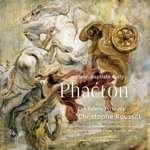|
Back
02/26/2014
Jean-Baptiste Lully: Phaéton, LWV 61
Emiliano Gonzalez Toro (Phaéton), Ingrid Perruche (Clymène), Isabelle Druet (Théone, Astrée), Gaëlle Arquez (Libye), Andrew Foster-Williams (Epaphus), Frédéric Caton (Mérops, Automne, Jupiter), Benoît Arnould (Protée, Saturne), Cyril Auvity (Triton, Le Soleil, La déesse de la Terre), Virginie Thomas (Une Heure, Une bergère égyptienne), Chœur de Chambre de Namur, Thibaut Lenaerts (Chorus Master), Les Talens Lyriques, Christophe Rousset (Conductor)
Recording: Salle Pleyel, Paris (October 25, 2012) – 153’
Aparté # AP062 – Booklet in French and English

   
Seventeenth century France was a time of great power and great egos, the successes of the country emanating from the royal monarchy under King Louis XIV. A belief that by ruling with an iron fist and culling only the finest from various aesthetic disciplines, King Louis XIV would once again redeem his country as being one of the mightiest in world. Jean-Baptiste Lully found his way into the royal court at an early age of 13, becoming the King’s most favored musical contributor of the time.
King Louis XIV strongly aligned his kingdom in mythology, commonly referred to as “The Sun King”. This nickname specifically pointed to Apollo, God of peace, arts, music and poetry, and in Lully’s Phaéton we actually see the life and dominion of the royal subject being demonstrated through these fictitious characters. Phaéton thus is a lesson of morality.
Established in 1991 by Christophe Rousset, Les Talens Lyriques’ ensemble heavily concentrates on bringing to the forefront French music from the Baroque and Classical periods. Trained as a harpsichordist, Rousset is the quintessential interpreter of these richly ornamented works. It, therefore, comes as no surprise that this Aparté recording of Phaéton is unsurpassed in the depth of talent, translating into flawless detail through instrument and voice.
The orchestra’s rendition of the “Prologue” is sharp and pulsating, poised with confidence. We are quickly delighted to joyous blends of voices in the choral sections. The majority of Lully’s characters sing through the score in recitative with a primary emphasis on accompagnato formation with solo harpsichord. Isabelle Druet’s Astrée is shiny and concise, especially in her delivery of grace notes. Paired (in this case as Théone) alongside Gaëlle Arquez as Libye, one will notice a striking similarity in timbre, the binary formations retaining exquisite detail and clarity. In the title role, Emiliano Gonzalez Toro weaves his way into impending doom by way of velvety delivery and lyrical legato; introduction to Phaéton is reminiscent of Mozart’s Così (1790), further demonstrating the tremendous impact Lully’s influences had on future generations of composers.
Ingrid Perruche expresses premonitions to her son (Clymène) in darkened tonality that even hints at a touch of edginess. Cyril Auvity possesses a soft and feathery voice in the representative roles of Triton, the Sun and the goddess of the Earth. Frédéric Caton anchors the lower notes with a stentorian reach as Mérops.
The choral stretches are superb, and in particular, the smaller collection of voices (i.e. Astraea’s companions, chorus of The Hours, Libye/Théone duet) have rarified radiance. Several orchestral passages (i.e. Chaconne, Marche, Air) are found throughout Lully’s Phaéton, and the dynamic qualities are nicely interpreted with guidance by Rousset that has progressive, rhythmic pacing.
Phaéton, a tragédie en musique, is only one of three (the others being Atys and Armide) Lully operas that ends in unpleasant circumstances. Few recordings exist of this opera, thereby placing insurmountable importance to this issue. Even though this is a live recording, the sound quality is impeccable. The physical presentation is an artistic collection unto itself. Baroque enthusiasts will be pleased with the outcome of this Phaéton under the Aparté label.
Christie Grimstad
|